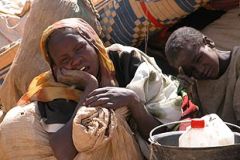Brutalised Darfurians look to Abuja talks to bring peace
By Anaclet Rwegayura
ADDIS ABABA, Ethiopia, June6, 2005 (PANA) — Despite the present lull that
raises optimism for peace, the overall situation in the strife-
torn Darfur region of western Sudan remains fluid and complex.

|
|
Newly arrived refugees at the Touloum camp – driven out of their homes by armed raids near the border town of Tiné. (WFP). |
Forces of the African Union (AU) Mission in Sudan, though limited
in numerical strength, have commendably deterred the wave of
violence and human rights abuses, at least in areas where these
troops are visible.
As seen through the eyes of women who have been widowed and the
thousands of orphaned children who have survived it, the Darfur
war accounts are horrifying.
The advantages of security and social stability that human beings
enjoy in other parts of the world are very much in short supply
in this region that over the past two years had run red with
blood.
Occasional skirmishes have combined with drought to put more and
more people on the run. They abandon their homesteads in remote
areas to flock to the already overpopulated camps of the
internally displaced persons (IDPs).
New arrivals, according to humanitarian agencies operating in the
region, are over-stretching the provision of essential services
and water wells in those camps were drying up.
The AU’s international partners have given the continental body a
pat on the back for the way it has faced up to and dealt with the
challenge of restoring peace in Darfur.
AMIS has created buffer zones of peace in which NGOs operate to
make sure that water and sanitation facilities are put in place
while they build makeshift schools for the children.
Until the first week of June 2005, there were 479,342 IDPs in
North Darfur, 770,808 in South Darfur and 715,708 in West Darfur.
Though not yet engaged in combat, the AU military and civilian
police contributed by Nigeria, Rwanda, Senegal, South Africa,
Kenya, Egypt, Ghana and Mauritania in the region show an
unmistakable devotion to duty.
International approval of the AMIS operation in Darfur up to this
time, however, should be no reason for complacency or for anybody
to congratulate himself. A lot more has to be done to return
normalcy in the region.
Speaking in military terms, AMIS Force Commander Major General
Festus Okonkwo told PANA at his common post in El Fasher: “We
don’t have any enemy to fight so far. We are actually trying to
bring peace to Darfur. We have not got into fighting yet.”
Since the situation stabilised about two months ago, he added:
“Janjaweed militias, who allegedly have been used by the
government [of Sudan] in trying to fight back rebel movements in
Darfur, have continued to cause some problems.”
No matter who the troublemakers might be in Darfur, their days
are numbered. With the support of the international community and
AU member States, AMIS is being enhanced and armed to the teeth.
More camps are being set up for troops, military observers and
civilian police at various locations in the mission area.
“By the time we have the enhancement of the force completed,
around September this year, we shall be in a position to
challenge provocation by the militias,” Okonkwo warned, adding
that his troops would then force their way into any location
within Darfur.
This explains why all parties involved in the Darfur crisis must
take the next round of peace negotiations under the aegis of the
AU very seriously. The talks are set to resume on 10 June 2005 in
Abuja, Nigeria.
Indeed, it could be a make-or-break session because, as far as
the resolution of the conflict is concerned, time is running out.
Opponents of the peace process in Darfur, should they resort to
the use of guns, could soon meet their Waterloo under the might
of AMIS troops.
For the authorities in Khartoum, there should be no ambiguity in
this message. This is the opportunity for them to cooperate fully
with AMIS and deliver peace to their own people.
Observers stress the fact that the Government of Sudan has the
power over the entire Sudanese territory and, therefore, must not
shy away its responsibility to stop violence and rebel attacks
against innocent and vulnerable groups of the population in
Darfur.
Not just for the sake of peace and stability, but also
credibility, they argue, the government must disarm all types of
militias and the so-called defence forces that roam around
villages in a disorderly fashion to threaten unarmed residents of
Darfur.
As one senior AMIS official in South Darfur told PANA, “it is not
uncommon to see kids moving around with assault rifles strapped
on their back. There are many child-soldiers but nobody accepts
their responsibility.”
“The challenge of the AU is to see an early political resolution
of the conflict in Darfur,” AU peace and security Commissioner
Said Djinnit told humanitarian agencies operating in the region at the weekend.
